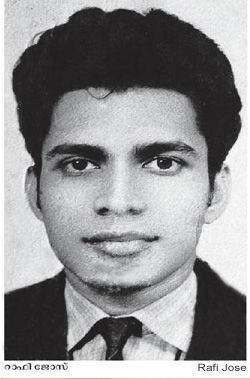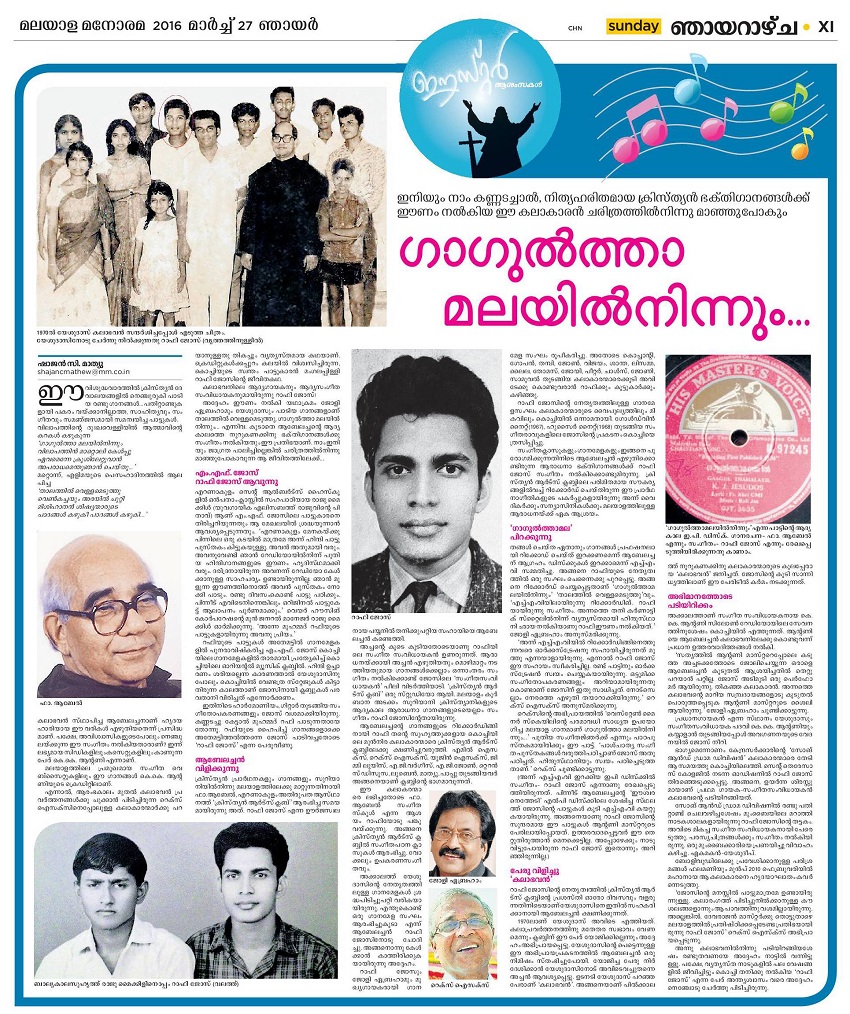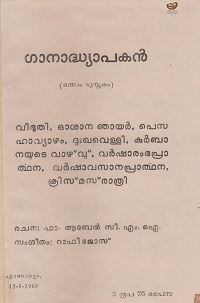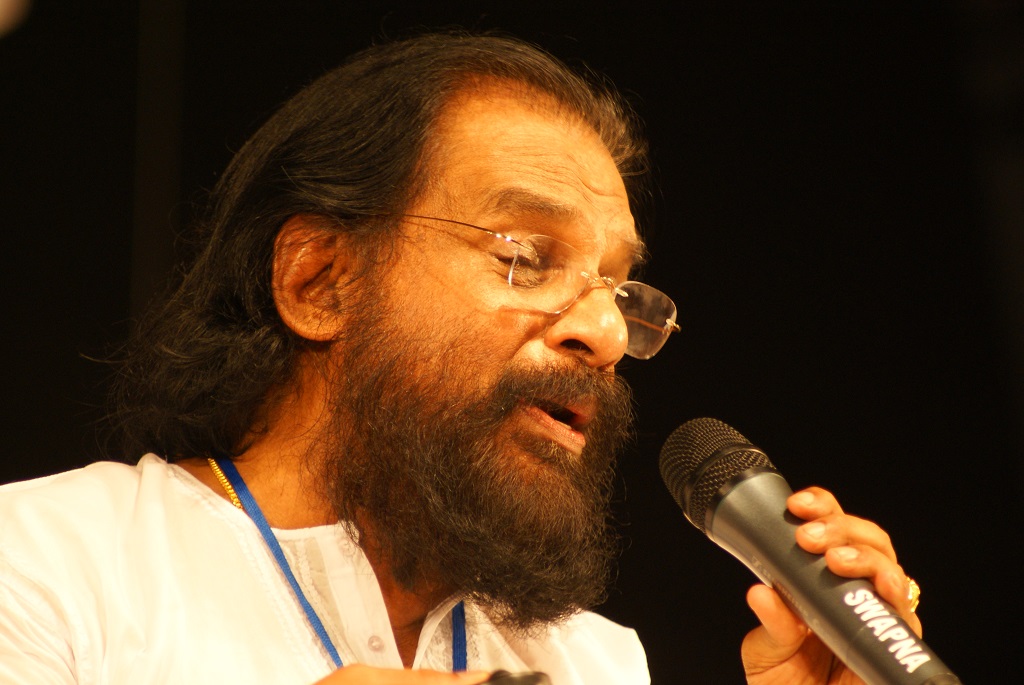Rafi Jose

Note: The Christian Musicological Society of India is grateful to Rex Isaacs for sharing this memoire about a legendary musician who captured the hearts of Kerala through his talents as a singer and composer of soulful melodies of Christian devotional songs. The people, places, as well as accounts of events that appear in this memoire are part of a larger narrative of the musical scene in the Greater Kochi area in the 1960s in particular, and the cultural history of Kerala in general. Rex’s intellectual honesty, sharp memory, and his acumen to read also the minds of artistes serve as the weaving threads of this narrative. If this reads almost like an eye-witness account, it is because Rex used to be, before migrating to Chennai, an embedded artiste as a performer (violin), composer, and music arranger, and above all, as a person endowed with a great degree of empathy toward his fellow artistes. The memoire shows that individual histories are intrinsically interconnected to the regional and national histories. We hope Rex will find time to share similar memoires of his other artistic acquaintances and enrich the web site of the Christian Musicological Society of India …….. Joseph J. Palackal

During my high school days at St.Albert's High School (1961 - 1964) in Ernakulam , I happened to meet M. F. Jose (a.k.a. “Rafi Jose”) who was mainly known as a skilled soccer player in the Senior School Team. His musical talents were hidden from himself and the public; he never participated in musical competitions oryouth festivals.It was Raju Michael,a classmate of Jose,who initially discovered the hidden talent in Jose, and went out of the way to mold him into an accomplished singer who specialized in rendering popular Hindi film songs sung by Mohammed Rafi.
During those days, the musical scene at the Ernakulam-Kochi area was a vibrant one.The leading music clubs were Azad Art's Club and Tansen Music Club at Ernakulam , and Oriental Music Club, at Cochin.Right from our school days my elder brother,Emile, and I used to participate in the concerts of Azad Club due to the patronage given by Job&George,the duo composers,and violinist Alfred D'Souza who used to take violin lessons from my Dad.It was indeed a privilege and an exhilarating experience to meet such talented singers asC. O. Anto, Zero Babu, and J. M. Raju, and be part of a professional orchestra whose members were renowned in the field of music.
Delayed Discovery of a Hidden Musical Talenter
Oriental Music Club under the leadership of violinist,Terrence D'Souza,had a group specialized in the performance of Hindi film songs;M. G. Baby and Stella were the lead singers.Even when the leading clubs in Ernakulam refused to give due recognition to M. F. Jose,it was Oriental Music Club that gave him a red carpet treatment and christened him as Rafi Jose, based on his special vocal capacity to emulate the tone of the famous singer, Mohammad Rafi (ironically, it was the same club that refused to promote the young singer, K. J. Yesudas, who eventually became a national hero, because of his “deplorable” Hindi diction).
Very soon, Rafi Jose became well known in and around Ernakulam and Cochin,and received invitations to sing on special occasions.The musical nights that Goldwin and Hussaier organized were known for their high standards and meticulous perfection.Rafi Jose's rendering of Hindi songs was the highlight of these shows.
Fr.Abel and the Christian Arts Club
It was around this time(mid 1960s) that Fr.Abel Periyappuram, C. M. I. (1920-2001)started a musical institution called Christian Arts Club within the premises of the Ernakulam Arch-Bishop's Palace on Broadway.The main goal of the club was to assist the vernacularization of the Syriac liturgy of the Syro Malabar Church.Fr.Abel roped in great composers like V.Dakshinamurthy,Job&George,Gopalan Master, and M. K. Arjunan.But somehow Fr. Abel was not so comfortable with working with them, and was in quest for some young talent,probably, from his own Catholic community, the Syro Malabar Church.Atlast, he found Rafi Jose who had a hybrid heritage of Latin and Syrian. Soon, Jose started proving his skills as a composer, and Fr.Abel was more than pleased.But how to propagate these compositions,was the big question.
Fr.Abel had no contacts with the musicians in Ernakulam or Cochin.Neither was he a musician himself to assess the ability and proficiency of a good musician.So he requested Jose to bring in some "good, disciplined and God fearing young musicians" to fulfilhis mission of recording and disseminating the new songs. Thus, it was through Jose that Fr.Abel got in touch with the instrument players from the Ernakulam and Cochin areas.At the early recording sessionswe used to have only a few instruments.I remember Jose himself on the harmonium,my younger brother,Eugene on the guitar,A. G. Varghese on the Tabla,his younger brotherA. G. John on the bongos, and myself on the violin.For bigger sessions we used to hire more musicians from the troupe of K. J. Yesudas.The singers at the beginning were V. T. John(who recently retired as the chief librarian at S. H. College,Thevara ,Lissamma,Neena and Soya.Later on, Jolly Abraham,Gopan,Thambi,Ibrahim,Shanthamma,Vijayam et al. joined the bandwagon.Nuns, priests, and laymen from various Syro Malaba churches thronged to the Christian Art's Club to get recorded copies of these songs.
Seeing the enormous enthusiasm, Fr. Abel proposed a novel idea of conducting Bible Ganamelas with the intention of further propagating his works.We devoutly worked toward that goal, but the outcome was disappointing.Even in the couple of churches that we performed, the response was lukewarm.So we convinced Fr.Abel about attracting audiences by having the second half of the concert with hit songs from the Hindi films. Although this had a tremendous impact initially, more and more requests poured in strictlyfor film songs.
Rafi Jose’s Melodies on the Gramophone Record
It is around this time that Fr.Abel decided to organize a gramophone recording of a few of his songs composed by Rafi Joseat the HMV studio in Madras.Jose was practically a self-taught musician.He went through books on Hindustani music and Western music, and tried to assimilate as much as possible.He and I hadprolonged discussions on harmonies and chordprogressions and their meaningful applications.Apart from handling the harmonium in a dexterous manner,he had a fairly good idea about the finger positions on the violin and guitar, and could even demonstrate his ideas on these instruments.I remember how we sat together and worked on his signature composition that become very popular, Gāgulthā malayil ninnum from the Mount Calvary; , which was composed in the natural minor scale.I wrote down the score in Staff notation and even suggested some minor changes in the chords that he had set. Later Fr.Abel published the score of this song as well as other compositions of Rafi Jose in staff notation (Abel & Jose 1969)
Unexpected Turn of Events
Around this time, K. K. Antony master, a great musician and exponent of the Carnatic classical music, came back to Kerala from his successful sojourn in Sri Lanka and made acquaintance with Fr.Abel. With his deep knowledge in Carnatic music,superior composing and pedagogic skills, and extremely polite behavior, Antony Master very soon became Fr.Abel's close collaborator. Maybe, his Syro Malabar roots, too, did the magic. With the advent of Antony Master, Fr.Abel's attitude toward Rafi Jose changed for the worse. Jose was completely side tracked and all the importance was given to Antony Master .I was actively involved in the recording sessions of Antony Master’s songs, too. I felt the pain of Rafi Jose, and even told Fr.Abel about how miserable Jos felt when he was ignored all of a sudden.
Fr.Abel was a clever manipulator.Knowing fully well the relationship between K. J. Yesudas and I, and my brother, Emile,he requested us to somehow get Yesudas affiliated to his Christian Arts Club.Both of us were part of Yesudas's orchestra during those days. Hence we had no inhibitions in asking Yesudas for such a favor.After some initial resentment, Yesudas agreed to our request. It was in late 1969, if I remember correctly, that Yesudas attended one of our committee meetings. Many VIPs attended that meeting just because they came to know Yesudas would be in attendance. Yesudas expressed his willingness to be part of the institution on condition that the name Christian Art's Club be replaced by a secular name. Fr.Abel was clever enough to instantly poke Yesudas’s brain to come up with a suitable name. And Yesudas came out with the name KALABHAVAN.That was accepted with a thunderous applause.
With Yesudas occupying the honorary post of Music Director of Kalabhavan and K. K. Antony in charge of all the composing work, Rafi Jose felt totally neglected and depressed
That is when the Song and Drama Division of the Govt.of India landed in Ernakulam to recruit musicians.The interviews and auditions were held at St.Teresa's College auditorium.Jose opened his heart to me saying that he wanted to somehow escape from Kalabhavan and even Ernakulam in order to avoid further humiliation.He requested me and my brother,Eugene,to accompany him when he sang for the audition.We readily obliged him, and the jury selected Jose.It was with tears in his eyes that he took leave of me that day. He never even told Fr.Abel about his departure,neither did Fr.Abel bother to enquire about him there after.
With his repertoire of Mohammed Rafi’s hit songs and experience as a composer,Jose did quite well in the Song and Drama Division.After completing a ten-year contract, however, he decided to try his luck in Bombay.Although he composed music for a few Marathi Dramas, he couldn't make it in Bollywood. Meanwhile,he fell in love with a Marathi girl, Elsa,and married her. They had a son,who is now working in USA.
Rafi Jose Shall Continue to Live through His Haunting Melodies
Unfortunately Jose drifted away even from his immediate relatives in Ernakulam .He passed away a year ago.When there was a controversy in the Malayala Manorama daily, regarding the composer of Gāgulthā malayil ninnum, I had to intervene and set the record straight. A Keralite, who is a neighbor of Elsa (Jose's wife), took the paper and read the write up to her.She somehow managed to get my phone number and thanked me whole heartedly for setting the record straight.She even remarked that she never knew that her husband was such a great man who is still remembered in Kerala. All said and done, Rafi Jose shall live through the soulful melodies that are sung during the Holy Week services in; the Syro Malabar communities around the world.

Public Comments
The writer is Rev. Fr. Abel CMI & the music director is Rafi Jose who was an excellent singer.He was Fr.Abel's right hand initially,and composed some beautiful songs.Remember the songs Thalathil Vellameduthu sung by Jolly Abraham and Gagultha Malayil Ninnum by Dasettan,released by HMV. Malakhamarude appam, Osana paduvin nathane vazhthuvin, Malakhamaronnu pady, Maheswara nin sudhinam kanan, daivame nin geham ethra mohanam, Manushya nee mannakunnu and so many more songs are composed by Rafi Jose. I'm sure because in front of so many famous musicians Jose composed this song and not KK Antony Master.. I was also there while Jose composing these songs.
യേശുദാസ് പോലും അവസരം കാത്തിരുന്ന വേദികൾ പരവതാനി വിരിച്ചു സ്വീകരിച്ചിരുന്ന(എം.എഫ്.ജോസ്)റാഫി ജോസ് എന്ന സംഗീതജ്ഞനെ ആരാണു ചരിത്രത്തിൽനിന്ന് മായ്ച്ചുകളയുന്നത്? Please read Manorama Sunday supplement 2016 മാർച്ച് 27,ഷാജൻ സി മാത്യു എഴുതിയ ലേഖനം.പീഡാനുഭവ വാരങ്ങളിൽ പള്ളികളിലും മാധ്യമങ്ങളിലും വർഷങ്ങൾ കഴിഞ്ഞിട്ടും ദു:ഖത്തിന്റെ അന്തരീക്ഷം തീർക്കുന്ന ""ഗാഗുൽത്താ മലയിൽ നിന്നും വിലാപത്തിൻ മാറ്റൊലി കേൾപ്പൂ""ഗാപാടി ആൽബങ്ങൾ ഇറക്കുംമ്പോളും,യുവ ഗായകർ പുതിയ രീതിയിൽ പാടി യൂറ്റുബിൽ ഇടുംമ്പോളും ഈ ഗാനത്തിന് ഈണം നൽകിയ മംഗലപിള്ളി ഫ്രാൻസിസ് റോസാ ദമ്പതികളുടെ മൂത്തമകൻ എം.എഫ്.ജോസ് എന്ന റാഫി ജോസിനെ മനപൂർവ്വം ഓർക്കാത്തതാണോ?,,അതോ ഇതുവരെ അറിയാത്തതാണോ?കലൂരിലെ വാട്ടർ അതോറിട്ടി ഓഫീസിന്റെ അടുത്തുള്ള മംഗലപിള്ളി എന്ന വീടാണ് റാഫി ജോസിന്റെ തറവാട്.അവിടെ അദ്ധേഹത്തിന്റെ സഹോദരൻ എം.എഫ്.ബേബിയും കുടുംബവും താമസിക്കുന്നു.ബോംബെയിൽ താമസമാക്കിയ റാഫിജോസ് ഇടയ്ക്കിടയ്ക്ക് കലൂരിലെ മംഗലപിള്ളിയിൽ വരുമായിരുന്നു.എന്റെ സുഹൃത്ത് Sanu Mangalapillyയെ കാണാൻ ചെല്ലുമ്പോളൊക്കെ ഇദ്ധേഹവുമായി ഞാനും വളരെ നേരം സംസാരിച്ചു ഇരിക്കാറുണ്ടായിരുന്നു.അത് ഒരു ഭാഗ്യമായി കരുതുന്നു.അതുകൊണ്ട് തന്നെ എനിക്കും എന്റെ സുഹൃത്ത്ക്കൾക്കും അറിയാമായിരുന്നു ഇദ്ധേഹമാണ് ഈ ഗാനങ്ങൾ എല്ലാം ചിട്ടപെടുത്തിയത് എന്ന്. 2010 ഫെബ്രു 26ന് അദ്ദേഹം നമ്മളിൽ നിന്ന് വേർപിരിഞ്ഞു.എങ്കിലും ലോകം ഉള്ളിടത്തോളം കാലം അദ്ധേഹത്തിന്റെ ഗാനങ്ങൾ നമ്മൾ പാടികൊണ്ടേയിരിക്കും.ഈ വൈകിയ വേളയിലെങ്കിലും സത്യം പുറത്തുകൊണ്ടു വന്ന ജേർണലിസ്റ്റ് ശ്രീ.ഷാജൻ സി മാത്യുവിന് അഭിനന്തനങ്ങൾ.
About Gaanaadhyaapakan
 This book is a valuable addition to the resources for researchers on the Christian music of Kerala, India. It tells the story of the meeting
This book is a valuable addition to the resources for researchers on the Christian music of Kerala, India. It tells the story of the meeting  of the musical minds of two great men: Fr. Abel Periyappuram, CMI (1920-2001) and Mangalappilly M. Jose (d. 2010), popularly known as Rafi Jose. Their collaboration happened in the 1960s at Ernakulam, Kerala. That was the time of transition of the Syro Malabar liturgy from Syriac to Malayalam. Drawing inspiration from the ancient Syriac liturgical texts, Fr. Abel wrote lyrics in Malayalam for the Holy week services, Benediction of the Blessed Sacrament, Christmas midnight service, as well as prayer services for the beginning and end of the calendar year. This was also the time when Fr. Abel pooled the best musical talents in the greater cochin area and formed the Christian Arts club, which eventually would evolve into Kalabhavan. Mangalappiily Jose was one of those gifted musicians; he had already become immensely popular by singing the Hindi film songs of Muhammad Rafi (hence the nickname “ Rafi Jose). Fr. Abel tested his talent as a composer by entrusting the new lyrics to Rafi Jose. Rafi Jose composed captivating melodies to those lyrics that became instantly popular. (These melodies continue to be sung in the Syro Malabar churches until this day). The gramophone company of India published a record that included two of Rafi’s compositions: “thālathil weḷḷameṭuthu” (for Maundy Thursday) as well as “gāgulthā malayil ninnum” (for Good Friday). These soulful melodies were heard from the public address systems of most of the churches in Kerala and became imprinted in the minds of the people of Kerala.
of the musical minds of two great men: Fr. Abel Periyappuram, CMI (1920-2001) and Mangalappilly M. Jose (d. 2010), popularly known as Rafi Jose. Their collaboration happened in the 1960s at Ernakulam, Kerala. That was the time of transition of the Syro Malabar liturgy from Syriac to Malayalam. Drawing inspiration from the ancient Syriac liturgical texts, Fr. Abel wrote lyrics in Malayalam for the Holy week services, Benediction of the Blessed Sacrament, Christmas midnight service, as well as prayer services for the beginning and end of the calendar year. This was also the time when Fr. Abel pooled the best musical talents in the greater cochin area and formed the Christian Arts club, which eventually would evolve into Kalabhavan. Mangalappiily Jose was one of those gifted musicians; he had already become immensely popular by singing the Hindi film songs of Muhammad Rafi (hence the nickname “ Rafi Jose). Fr. Abel tested his talent as a composer by entrusting the new lyrics to Rafi Jose. Rafi Jose composed captivating melodies to those lyrics that became instantly popular. (These melodies continue to be sung in the Syro Malabar churches until this day). The gramophone company of India published a record that included two of Rafi’s compositions: “thālathil weḷḷameṭuthu” (for Maundy Thursday) as well as “gāgulthā malayil ninnum” (for Good Friday). These soulful melodies were heard from the public address systems of most of the churches in Kerala and became imprinted in the minds of the people of Kerala.

Meanwhile, Fr. Abel and Rafi Jose embarked on an unusual project of publishing this book (printed at Mar Louis Memorial Press at Ernakulam, in 1969) with the lyrics and music of their songs in Western staff notation. The book is a monument to their great talents, their musical collaboration, and their intention to enhance Western musical literacy among musicians in Kerala.
In the absence of an Introduction, we do not know who transcribed the melody in staff notation. To clarify this, I had a telephone conversation with Rex Isaacs (18 August 2016), who was closely associated with Christian Arts Club and, later, Kalabhavan. Rex is a violinist in the Western tradition and comes from a family of musicians. Rex told me that he assisted Rafi Jose in preparing the score of the melodies of “thālathil weḷḷameṭuthu” and “gāgulthā malayil ninnum” as well as the background music for those melodies, before they traveled to Madras (Chennai) for the audio recording at HMV studio. Rex reiterated that the transcriptions that are printed in the book are not his. He thinks that Mr. Patrick David, who knew Rafi Jose, very likely prepared the score that is printed in the book. Rex added that he could not understand the reason for the addition of a bar line after the time signature on the opening staff, and then a measure-long space and bar line at the beginning of subsequent staves. In any case, the score helps us to understand the melody as the composer envisaged it; it also helps us to understand how a great singer like K. J. Yesudas emotes with and interprets the melody, and gives it a different life.
I happened to see the book, by chance, during a visit to the music library at Nadopasana at Thodupuzha, that I started in 1986. This was in the first week of August 2016. While browsing through the collection of recordings and books, Fr. Kurian Puthenpurackal,CMI, the director of Nadopasana brought a set of books from his personal collection. Gānādhyāpakan was one of them. I was overjoyed to see the book, and immediately recognized its historical value. Fr. Puthenpurackal said that he got the book from Fr. John Kachiramattom, CMI several years before. Ironically, this book and its content never came up in my conversation with Fr. Abel, during my three years at Kalabhavan.
The book assumes another layer of importance at the present time. It offers a definitive answer to the recent disputes regarding the authorship of the melody of "gāgulthā malayil ninnum." The dispute arose after the publication of an article (“gāgulthā malayil ninnum”), on Rafi Jose by Shajan C. Mathew in the Sunday edition of Malayala Manorama Daily, on March 27, 2016. In the article, Shajan Mathew cited much evidence to support the authorship of the melody by Rafi Jose Another living composer, however, disputed Shajan’s findings and claimed authorship of the melody. The Christian Musicological Society of India gladly presents the pdf version of the book for the benefit of scholars and journalists as the final proof of the authorship. May the soul of Rafi Jose have the last laugh, and rest in peace!
Joseph J. Palackal
www.TheCMSIndia.org
August 10, 2016
References
Abel, C.M.I., Fr. and Rafi Jose. (1969). Gānādhyāpakan (Malayalam, Music teacher).
Ernakulam: Mar Louis MemorialPress. Review by Joseph J. Palackal in Gagultha malayil ninnum
Mathew, Shajan C. “Gāgulthā Malayil Ninnum” (Malayalam, From Mount Calvary) .
Manorama, Sunday, 27 March 2016, p. xi


